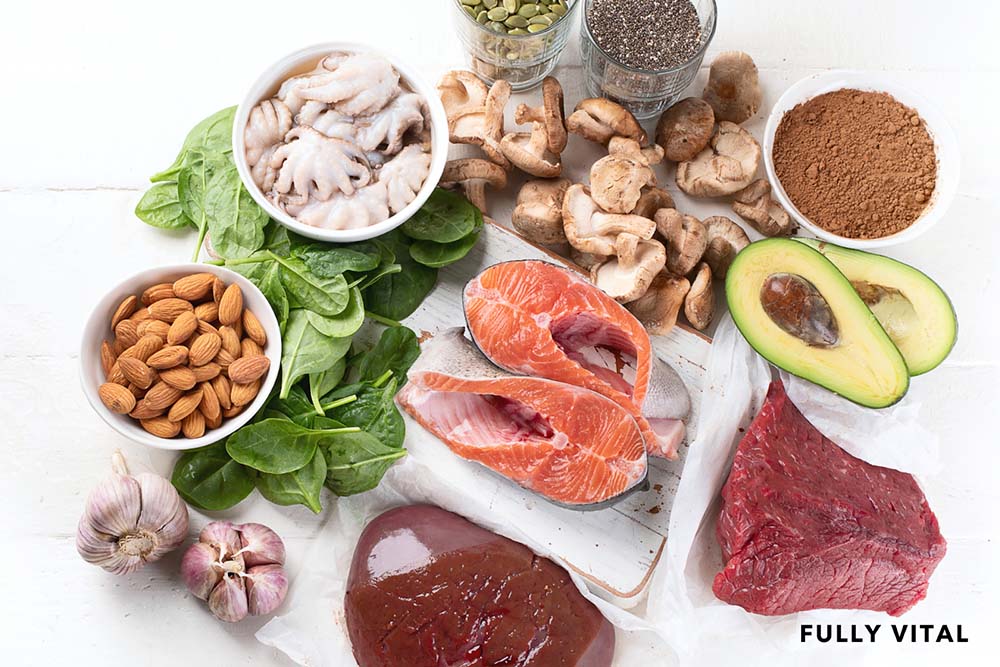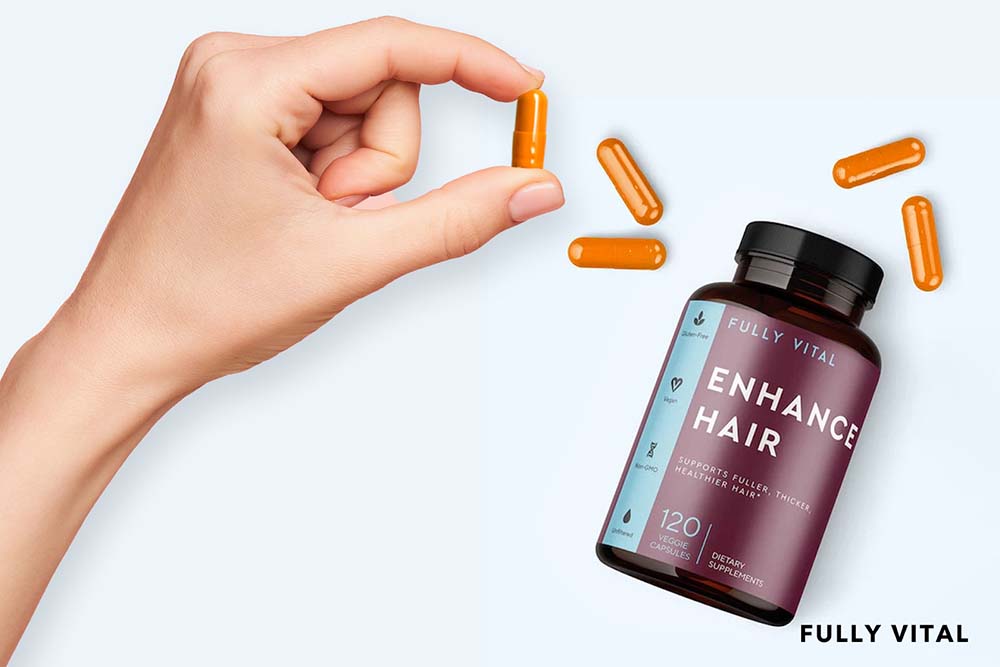
The Importance of Zinc for Hair Growth
If you're looking to stimulate hair growth, you've probably come across various nutrients and supplements that claim to help.
One such nutrient that plays a crucial role in maintaining healthy hair is zinc.
In this article, we'll dive into the world of zinc and explore its importance, benefits, how it works and any potential downsides.

I LOVE MY HAIR NOW
FullyVital hair serum and hair vitamins made tremendous improvements in my hair. I truly love my hair now.
Dorit S.,
What is Zinc?
Zinc is an essential mineral that is found in cells throughout the body.
It is involved in numerous biological processes, including protein synthesis, cell division, and wound healing.
In terms of hair growth, zinc plays a vital role in maintaining the health of hair follicles and promoting their growth.(1)
This is the reason we've included zinc in FullyVital hair growth vitamins.
Why is Zinc Important for Hair Growth?
Zinc deficiency has been linked to hair loss and thinning hair.
This mineral helps to support the structure of hair proteins and assists in the production of new cells, including those responsible for hair growth.
Adequate levels of zinc in the body can help prevent hair loss and promote stronger, healthier hair.(2)
How Does Zinc Work for Hair Growth?
Zinc supports the production of keratin, a protein that makes up the structure of hair.
It helps to keep the oil glands around the hair follicles functioning properly, ensuring the scalp remains moisturized and healthy.
Additionally, zinc strengthens the hair shaft and helps prevent breakage, leading to longer and thicker hair.(3)
The Benefits of Zinc for Hair Growth
Here are some key benefits of incorporating zinc into your hair care routine:
Promotes hair growth
By nourishing hair follicles and stimulating cell production, zinc helps promote hair growth.
Prevents hair loss
Adequate levels of zinc can help prevent hair loss and thinning by strengthening hair follicles.
Improves hair strength
Zinc strengthens the hair shaft, reducing breakage and brittleness.
Enhances scalp health
Zinc supports a healthy scalp by regulating oil production and preventing dandruff and other scalp conditions.
Are There Any Downsides to Zinc?
While zinc is generally safe for consumption, excessive intake can lead to adverse effects.
It's essential to stick to the recommended daily dosage and consult with a healthcare professional if you have any concerns or pre-existing conditions.
Some potential side effects of excessive zinc intake include nausea, vomiting, and anemia.
Should I Take Zinc Everyday?
Taking zinc daily can be beneficial for overall health and hair growth.
Since our bodies do not naturally store zinc, regular intake is necessary to maintain adequate levels.
However, it's important to follow the recommended daily dosage as excessive intake can lead to negative side effects.
Consult with a healthcare professional to determine the appropriate dosage for your specific needs.
When Should I Take Zinc: Morning or Night?
The timing of zinc intake is not as crucial as consistency in taking it daily.
Some people prefer taking zinc in the morning to kick start their day, while others find it more convenient to take it at night.
Ultimately, it's a matter of personal preference.
However, if you're taking other medications or supplements, it's advisable to consult with a healthcare professional to ensure there are no interactions or specific instructions regarding the timing of your zinc intake.
Which Is Better for Hair Growth: Zinc or Iron?
Both zinc and iron play important roles in hair growth.
While zinc supports the health of hair follicles and helps prevent hair loss, iron is necessary for carrying oxygen to the hair roots and promoting healthy hair growth.
Both minerals are essential, and a deficiency in either can lead to hair problems.
It's best to maintain a balanced diet that includes foods rich in both zinc and iron to support optimal hair growth and overall health.
Which Zinc Tablet Is Best for Hair?
Choosing the right zinc tablet for hair growth depends on various factors, including the formulation, dosage, and any additional ingredients.
Here are a few key points to consider:
-
Zinc gluconate: This form of zinc is commonly used in supplements and is generally well-absorbed by the body.
-
Dosage: Look for a zinc tablet that provides the recommended daily dosage for hair growth, which is typically around 11 mg for adult women.
-
Additional ingredients: Some zinc supplements may contain additional vitamins or minerals that support hair health, such as biotin or vitamin C.
Try the FullyVital Enhance hair growth vitamins for zinc and many other nutrients and superfoods for thicker, fuller hair..
What Are the Alternatives to Zinc?
If you're unable to take zinc or prefer alternative options, there are other nutrients and supplements that can also contribute to healthy hair growth.
Consider the following alternatives:
-
Biotin: Biotin, also known as vitamin B7, is a popular supplement for hair growth.
-
Iron: Iron deficiency can lead to hair loss, so ensuring sufficient iron intake is important.
- Vitamins A, C, and E: These vitamins provide antioxidant protection and promote healthy hair.
Does Zinc Make Hair Thicker?
Zinc plays a role in maintaining the strength and structure of hair follicles, which can contribute to thicker-looking hair.
By supporting the production of keratin, zinc helps to fortify the hair shaft, reducing breakage and brittleness.
However, it's important to note that individual results may vary.
Zinc alone may not magically transform thin hair into significantly thicker hair, but it can certainly help improve overall hair health and thickness when combined with a balanced diet, proper hair care, and other supportive measures.
Experience the Power of Fully Vital: Unlock Your Hair's Full PotentialAre you ready to embark on a journey towards healthier, more vibrant hair? At Fully Vital, we're passionate about helping you stop the aging of your hair, so you can embrace a healthier relationship with your locks. Our science-backed hair growth products are designed to make a real difference. Here's what sets us apart:
Join the Fully Vital community today and take the first step towards healthier, more youthful hair. Discover the transformative power of our hair growth products and reclaim your locks' full potential. |
Final Thoughts On Zinc
Zinc emerges as a key player in the realm of hair growth and overall hair health.
From understanding its importance in maintaining healthy hair follicles to its role in promoting hair growth and preventing hair loss, zinc proves to be a valuable mineral to incorporate into your hair care routine.
Whether you choose to consume zinc through a balanced diet or opt for zinc supplements, ensuring adequate intake can contribute to stronger, thicker, and more vibrant hair.
At Fully Vital, we understand the significance of zinc in maintaining a healthy relationship with your locks.
Our range of hair growth products is designed to address the aging of hair, providing you with effective solutions to support your hair's vitality and well-being.
Explore our product offerings to discover how our solutions can help you achieve your hair growth goals.
Remember, consulting with a healthcare professional or a trichologist can provide personalized guidance and recommendations tailored to your unique needs.
Embrace the power of zinc and embark on a journey towards healthier and more beautiful hair.
Frequently Asked Questions about Zinc
Can zinc reverse hair loss?
While zinc can help prevent hair loss and promote hair growth, it's important to address the underlying causes of hair loss for optimal results.
How much zinc should I take for hair growth?
The recommended daily dosage of zinc for hair growth is typically around 11 mg for adult women.
It's best to consult with a healthcare professional to determine the right dosage for you.
Can zinc deficiency cause hair loss?
Yes, zinc deficiency has been associated with hair loss and thinning. Ensuring adequate zinc levels in the body can help maintain healthy hair.
Can I get enough zinc from my diet alone?
Zinc can be obtained from various food sources, such as red meat, seafood, nuts, and seeds.
However, some individuals may require supplements to meet their recommended daily intake.
How long does it take for zinc to promote hair growth?
The timeline for visible hair growth varies from person to person.
Consistent use of zinc supplements or incorporating zinc-rich foods into your diet can support hair growth over time.
Can zinc cause any allergies or skin reactions?
Allergies or skin reactions to zinc are rare but possible.
If you experience any adverse reactions, discontinue use and consult with a healthcare professional.
Can zinc be used topically for hair growth?
While zinc-based shampoos or hair treatments exist, the efficacy of topical zinc for hair growth is not yet well-established.
It's best to focus on ensuring adequate zinc intake through diet or supplements.
Is Zinc Good for Hair and Skin?
Yes, zinc is beneficial for both hair and skin health.
It supports the production of keratin, a protein that is essential for the structure of hair and skin.
Adequate zinc levels can help promote healthy hair growth, prevent hair loss, and maintain the overall condition of the scalp.
Additionally, zinc has anti-inflammatory properties that can contribute to healthier skin by reducing redness and inflammation.
What Are the Best Food Sources of Zinc?
Including foods rich in zinc in your diet is a great way to ensure sufficient intake. Some of the best food sources of zinc include:
-
Shellfish: Oysters, crab, and shrimp.
-
Meat: Beef, lamb, and poultry (especially dark meat).
-
Legumes: Chickpeas, lentils, and beans.
-
Nuts and Seeds: Pumpkin seeds, sesame seeds, and cashews.
-
Dairy: Cheese, milk, and yogurt.
- Whole Grains: Quinoa, oats, and brown rice.
How Can I Get More Zinc in My Diet?
If you want to increase your zinc intake through your diet, here are some tips:
- Incorporate zinc-rich foods into your meals and snacks. Try adding more shellfish, lean meats, legumes, nuts, and seeds to your diet.
- Opt for whole grains over refined grains.
- Include dairy products like cheese, milk, or yogurt in your daily meals.
- Experiment with new recipes and cooking methods that incorporate zinc-rich ingredients.
What Is the Best Way to Apply Zinc Topically for Hair Growth?
While there are zinc-based shampoos and hair treatments available, the efficacy of topical zinc for hair growth is not yet well-established.
However, if you're interested in trying topical zinc, here are a few tips:
- Look for hair products that specifically mention zinc in their ingredients.
- Follow the instructions provided by the manufacturer for the recommended usage and duration.
- Be mindful of any potential scalp reactions or allergies and discontinue use if you experience any adverse effects.
- It's important to note that topical application may not have the same impact as internal consumption of zinc for hair growth.
Focus on maintaining a balanced diet and considering zinc supplementation if necessary.
How Can I Test My Zinc Levels?
If you suspect a zinc deficiency or want to check your zinc levels, the best approach is to consult with a healthcare professional.
They can perform a blood test to determine your zinc status accurately.
A blood test measures the level of zinc in your serum, providing valuable information to guide appropriate supplementation or dietary changes if needed.
It's important to rely on professional advice rather than self-diagnosing or self-medicating based on assumptions.
Sources
- Guo, S., & DiPietro, L. A. (2010). Factors Affecting Wound Healing. Journal of Dental Research, 89(3), 219–229. https://doi.org/10.1177/0022034509359125
- Better Health Channel. (2020, December 20). Vitamins and minerals | betterhealth.vic.gov.au. Www.betterhealth.vic.gov.au. https://www.betterhealth.vic.gov.au/health/HealthyLiving/Vitamins-and-minerals
- Nutrition for Hair Regrowth | Sutter Health. (n.d.). Www.sutterhealth.org. https://www.sutterhealth.org/ask-an-expert/answers/nutrition-for-hair-regrowth








